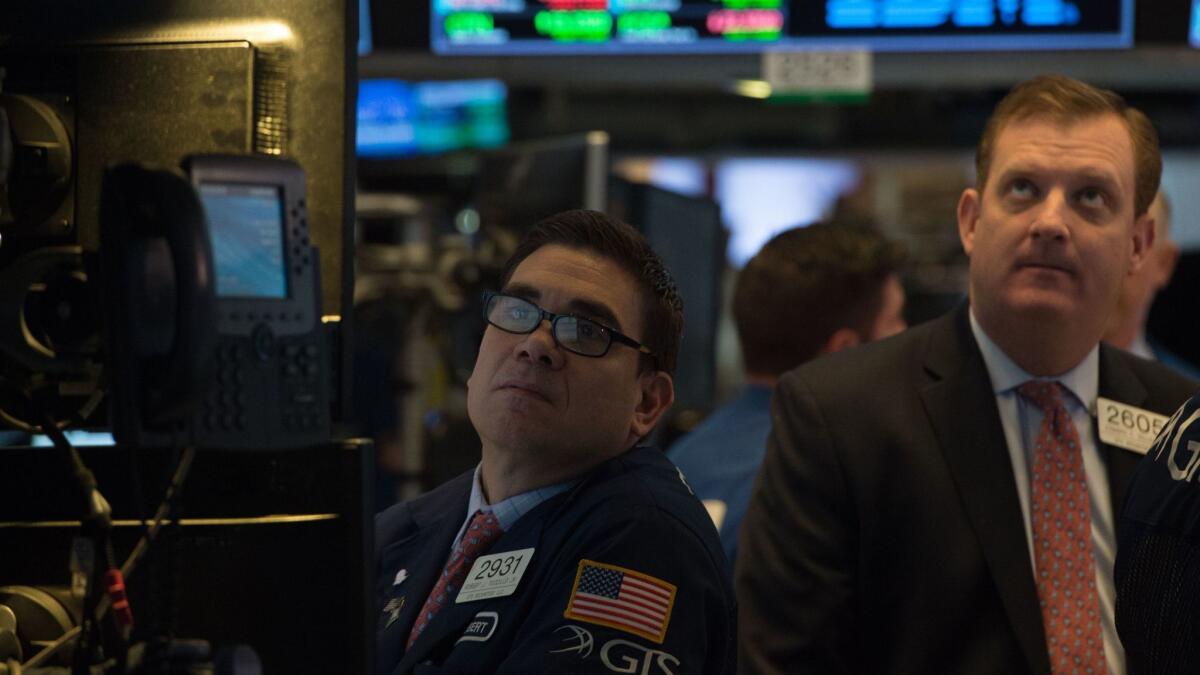Stocks fall as Walmart shares plunge the most in 30 years

- Share via
The biggest drop in Walmart’s stock in 30 years and losses in other sectors pulled U.S. indexes lower Tuesday, snapping a six-day winning streak.
The losses deepened in the last hour of trading into a broad sell-off that erased early gains led by technology companies.
Walmart plunged more than 10% after reporting weak online sales and disappointing earnings. Grocery store operators, retailers, healthcare companies and industrial stocks accounted for much of the market’s slide.
“Investors have been lulled into a false sense that stock markets are not volatile,” said Doug Cote, chief market strategist for Voya Investment Management. “Last week was one of the best weeks in years, and as we go back to normal volatility, you’re going to see what you would expect: normal ups and downs.”
The Standard & Poor’s 500 index fell 15.96 points, or 0.6%, to 2,716.26. The Dow Jones industrial average slid 254.63 points, or 1%, to 24,964.75. The Nasdaq composite index edged down 5.16 points, or 0.1%, to 7,234.31. The Russell 2000 index of smaller-company stocks fell 13.56 points, or 0.9%, to 1,529.99.
The S&P 500, a benchmark for many index funds, capped its strongest week in five years Friday, recovering more than half the losses it suffered in a plunge at the beginning of this month. Stocks began giving back some of those gains early Tuesday as trading reopened after a long holiday weekend and investors began sizing up company earnings while keeping an eye on the bond market.
The yield on the 10-year Treasury, which is used as a benchmark for mortgages and other loans, has been rising in recent months from a low of 2.04% in September. Higher bond yields indicate investors expect more risk of inflation. The higher yields also can threaten stock prices by making bonds more appealing than stocks.
“Some of the broader concerns on investors’ minds right now are looking across to the bond market and seeing the 10-year Treasury starting to approach that 3% level,” said Bill Northey, vice president at U.S. Bank Wealth Management.
Bond prices, which declined early Tuesday, ended up little changed. The yield on the 10-year Treasury held at 2.88%.
Walmart sank 10.2% to $94.11, the biggest loss in the Dow and S&P 500. The tumble represents the stock’s worst single-day drop since January 1988. Investors were disappointed with the retail giant’s fourth-quarter results, which missed Wall Street’s expectations as the company wrestled with slower e-commerce sales during the busiest time of the year.
Several other big retailers also fell, including Target, which slid 3% to $72.86. Ross Stores dropped 2.7% to $77.98.
Gap declined 5% to $31.61 after the clothing chain said the head of its Gap brand will leave the company. Jeff Kirwan, who has been with the company since 2004, had led the namesake brand since the end of 2014. The Gap said Kirwan had failed to achieve “the operational excellence and accelerated profit growth” that the company expected for the brand.
Genuine Parts slid 5.2% to $94.67 after the auto and industrial parts company gave a disappointing profit forecast for 2018.
Company deals offset some of the market slide.
NXP Semiconductor jumped 6% to $125.56 after Qualcomm raised its offer for the company to $127.50 a share, or $43.22 billion, from $110 a share. The move comes as Broadcom is trying to buy Qualcomm. Qualcomm shares fell 1.3% to $63.99.
Rite Aid rose 3.3% to $2.20 as traders welcomed news that grocery store operator Albertsons agreed to buy more than 2,500 Rite Aid stores. Albertsons owns brands including Safeway. The deal will double the amount of drugstores it owns.
DineEquity leaped 16% to $63.44 after the Glendale company, which owns the IHOP and Applebee’s restaurant chains, posted fourth-quarter results that beat analysts’ expectations and issued upbeat guidance for 2018. The company also unveiled some steps to help bolster sales and earnings and changed its name to Dine Brands Global Inc.
Benchmark U.S. crude rose 22 cents to $61.90 a barrel in New York. Brent crude, used to price international oils, fell 42 cents to $65.25 a barrel.
In other energy futures trading, heating oil rose 2 cents to $1.93 a gallon. Wholesale gasoline was flat at $1.75 a gallon. Natural gas rose 6 cents to $2.62 per 1,000 cubic feet.
Gold fell $25, or 1.8%, to $1,331.20 an ounce. Silver fell 27 cents to $16.44 an ounce. Copper fell 6 cents to $3.19 a pound.
The dollar rose to 107.30 yen from 106.55 yen. The euro fell to $1.2336 from $1.2408.
Major indexes in Europe ended mostly higher. Germany’s DAX rose 0.8%, and France’s CAC 40 gained 0.6%. Britain’s FTSE 100 was flat.
Earlier in Asia, Japan’s benchmark Nikkei 225 lost 1%, South Korea’s Kospi lost 1.1%, and Hong Kong’s Hang Seng fell 0.8%. Stocks were mixed in Southeast Asia, while markets in mainland China were still closed for lunar new year holidays. Australia’s S&P/ASX 200 inched down.
UPDATES:
2:50 p.m.: This article was updated with closing prices, context and analyst comment.
9:25 a.m.: This article was updated with more recent market prices.
This article was originally published at 7:30 a.m.
More to Read
Inside the business of entertainment
The Wide Shot brings you news, analysis and insights on everything from streaming wars to production — and what it all means for the future.
You may occasionally receive promotional content from the Los Angeles Times.










